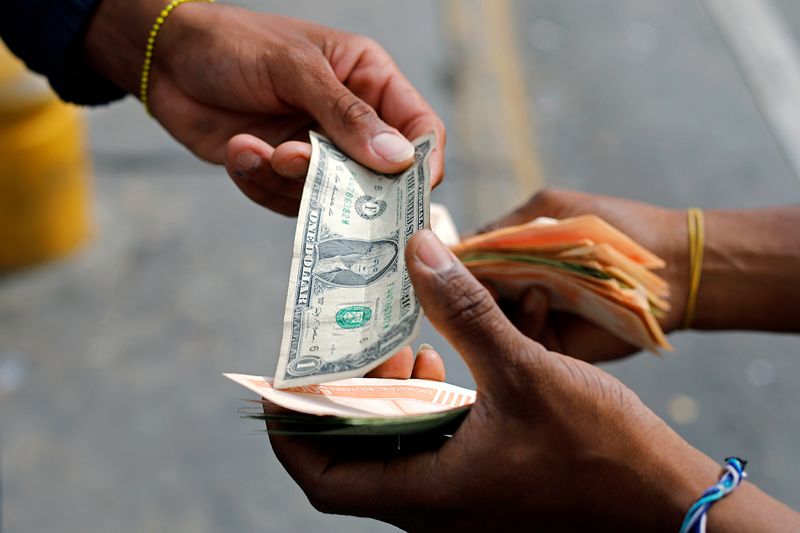By Corina Pons and Mayela Armas
CARACAS (Reuters) - Venezuelan President Nicolas Maduro is pressing banks to implement digital payment systems as hyperinflation prompts chronic shortages of cash in the bolivar currency, three people familiar with the talks told Reuters.
Maduro has targeted the public transit system - where roughly three-quarters of all circulating cash is spent - as the first stage of a plan he calls "the digital bolivar." In January, he asked banks to deliver point-of-sale terminals to the Caracas subway system and bus drivers, said the people, who spoke on the condition of anonymity.
With annual inflation hitting 2,665%, long lines form many mornings outside banks in Caracas as residents seek to withdraw a maximum of 400,000 bolivars - the equivalent of 20 U.S. cents - just to pay round trip transit fare to get to work.
Venezuelans have stopped using cash bolivars for food and many other day-to-day purchases. It would take forty bills of 50,000 bolivars to buy 1 kilo (2.2 lb) of rice. Instead, many use U.S. dollars in cash or debit cards - sometimes backed by U.S.-dollar accounts at local banks.
But many poor do not have bank accounts and services like public transit cannot process digital payments.
In a sign of worsening cash shortages, the central bank on March 5 announced it would begin to issue bills worth 1 million bolivars each. Even that would be worth just a handful of rides.
"Paying transport fares is complicated because there is no cash," said Marina Ospino, a part-time salesperson and mother of two, as she rode a bus. "And to run an errand, you need to have a fortune."
Neither Venezuela's information ministry nor the central bank responded to requests for comment.
While digital payments for public transport are the norm worldwide, Venezuela never adopted a fare card system.
Maduro's move is similar to a decision by inflation-stricken Argentina a decade ago to introduce a fare card in the face of coin shortages.
Venezuela's cash shortages and hyperinflation have led to informal dollarization in the oil-reliant economy. Maduro has celebrated the dollar's use an "escape valve" to U.S. sanctions aimed at ousting him, which he blames for the South American country's woes.
But Maduro has resisted abandoning the bolivar, instead pushing banks to help more Venezuelans open accounts and obtain debit cards, the financial sector sources said.
The amount of cash currently in circulation amounts to just 2% of money supply, down from 7% a few years ago, according to the central bank.
The result: snaking lines outside banks.
"We are only in line for transit fare," said Karina, a nurse who declined to give her last name while waiting to withdraw 400,000 bolivars from a state-owned bank in Caracas. "With that, you cannot even buy a caramel."
'IT'S DISAPPEARING'
Even obtaining paper to print banknotes has been complicated for Venezuela. The government slashed spending amid a seven-year recession spurred by a collapse in oil prices and the unraveling of its socialist model, marked by expropriations, as well as price and foreign exchange controls.
In 2020, Venezuela purchased two shipments of secure paper for cash printing from a Brazilian company, according to Import Genius, a firm that collects customs records for the import-export industry. An effort to print bills in Turkey was unsuccessful, two people familiar with the matter said.
In a state television interview this year, Maduro was asked if physical money was disappearing.
"Yes, it is disappearing. For Venezuela that is a big advantage," Maduro said, without providing further details.
Plans to boost digital payments have been slow-going because of the high costs of imported point-of-sale terminals and debit cards, the industry sources said.
In the absence of bolivars, many public transit users are turning to U.S. dollars to pay fares. It is common to see bus drivers' assistants who collect fares holding wads of greenbacks.

"That's what has saved us, the dollar," said Jose Espinoza, a bus driver in western Caracas. "Few people have bolivars in cash ... Right now everyone carries dollars."